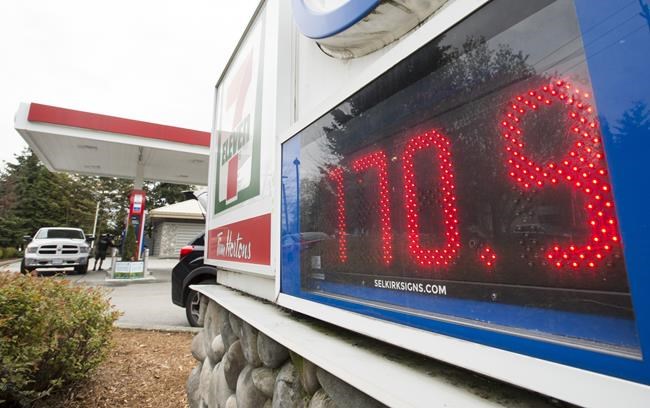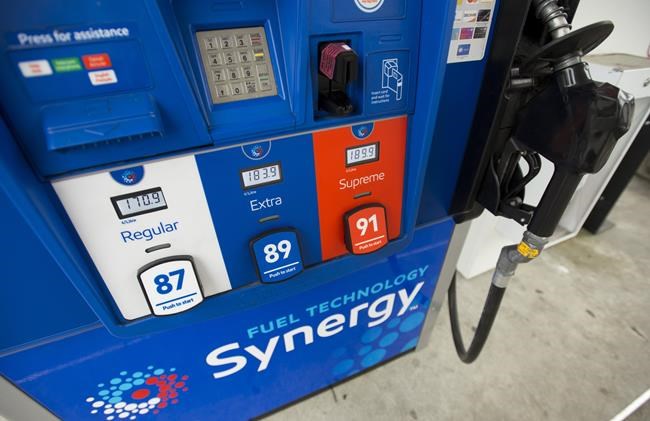Vancouver expected to headline long Canadian summer of high gasoline prices
Advertisement
Read this article for free:
or
Already have an account? Log in here »
To continue reading, please subscribe:
Monthly Digital Subscription
$0 for the first 4 weeks*
- Enjoy unlimited reading on winnipegfreepress.com
- Read the E-Edition, our digital replica newspaper
- Access News Break, our award-winning app
- Play interactive puzzles
*No charge for 4 weeks then price increases to the regular rate of $19.00 plus GST every four weeks. Offer available to new and qualified returning subscribers only. Cancel any time.
Monthly Digital Subscription
$4.75/week*
- Enjoy unlimited reading on winnipegfreepress.com
- Read the E-Edition, our digital replica newspaper
- Access News Break, our award-winning app
- Play interactive puzzles
*Billed as $19 plus GST every four weeks. Cancel any time.
To continue reading, please subscribe:
Add Free Press access to your Brandon Sun subscription for only an additional
$1 for the first 4 weeks*
*Your next subscription payment will increase by $1.00 and you will be charged $16.99 plus GST for four weeks. After four weeks, your payment will increase to $23.99 plus GST every four weeks.
Read unlimited articles for free today:
or
Already have an account? Log in here »
Hey there, time traveller!
This article was published 12/05/2019 (2411 days ago), so information in it may no longer be current.
CALGARY – Gasoline prices are expected to remain just below record highs all across Canada this summer except in Vancouver — where a perfect storm of factors will likely ensure motorists continue to set new all-time records at the pumps.
Fuel market analysts say average retail prices in Canada are within a penny or two of their year-ago levels, which were some of the highest on record for many markets.
“Vancouver certainly is (at historic highs) but the other major markets we’re looking at, such as Calgary, Toronto, Halifax, Montreal, they’re not exceeding historical levels, they’re basically at historic levels,” said Michael Ervin, senior vice-president at the Kent Group Ltd.

The average price of gasoline in major Canadian markets last week was about $1.34 per litre, but it varied from around $1.23 in Calgary and Winnipeg to the high of $1.70 or more in Vancouver.
Gasoline prices rise every spring due to factors including the higher cost of making summer gasoline — which requires an extra four or five cents per litre for additives to prevent evaporation — and supply interruptions as refineries shut down for routine maintenance, the analysts said.
Prices have also risen in part due to the federal carbon tax on fuel that was applied to Saskatchewan, Ontario, New Brunswick and Manitoba on April 1.
Analyst Dan McTeague of GasBuddy.com said demand will support fuel prices this year, but other factors could cause predictions to change if oil prices are affected.
“Demand is really strong in the United States, it’s OK in Canada, but the signals are really going to depend on geopolitics and on whether or not the world finds itself in a trade war. All bets are off in that circumstance,” he said.
The rising prices in the Vancouver area have put pressure on B.C. Premier John Horgan who last week asked the B.C. Utilities Commission to consider investigating why prices have risen by more there than in the rest of the country.
The analysts say there’s no mystery — British Columbians are paying more because the province’s two small refineries don’t produce enough to supply the market so they rely on imports from Alberta on the Trans Mountain pipeline, which is full, and U.S. refineries in Washington, which have been hit with longer-than-expected spring outages.
McTeague said the cost of an average litre of gasoline in Vancouver breaks down to about 52 cents per litre for the oil, 33 cents for the U.S. refinery, four cents in wholesaler markup, about 12 cents in retailer margins, 52.5 cents in federal, provincial and municipal carbon taxes and 10 to 15 cents per litre due to B.C.’s low carbon fuel standard regulations.

The last item is a hidden cost that’s difficult to measure, he said. It establishes a minimum renewable content and carbon intensity level in fuel, while requiring credit trading if those targets aren’t reached.
Parkland Fuel Corp., which owns the 55,000-barrel-per-day capacity Burnaby, B.C., refinery, says it operated at a utilization rate of about 92 per cent in the first quarter of 2019 and that it started processing bio-fuels such as canola and tallow to help bump up its production of lower carbon intensity fuels.
Prices in Canada will be supported over the summer by higher prices in the United States, where domestic demand is expected to be robust and where fuel exports are on the rise, Ervin said.
Last week, the U.S. Energy Information Administration raised its forecast for nationwide average gasoline prices through September to US$2.92 a gallon, about seven cents more than last summer, partly due to higher margins for refining gasoline.
Follow @HealingSlowly on Twitter.


